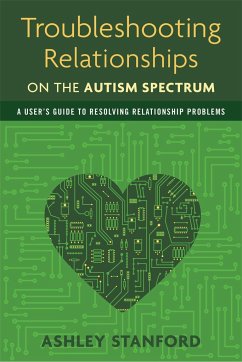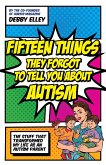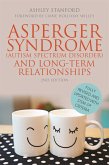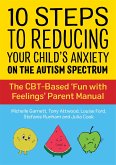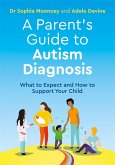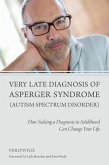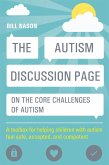Ashley Stanford
Troubleshooting Relationships on the Autism Spectrum
A User's Guide to Resolving Relationship Problems
28,99 €
inkl. MwSt.
Versandfertig in 2-4 Wochen

14 °P sammeln
Ashley Stanford
Troubleshooting Relationships on the Autism Spectrum
A User's Guide to Resolving Relationship Problems
- Broschiertes Buch
- Merkliste
- Auf die Merkliste
- Bewerten Bewerten
- Teilen
- Produkt teilen
- Produkterinnerung
- Produkterinnerung
Don't you wish relationships came with a manual? This user's guide to relationships adopts a practical troubleshooting approach to resolving difficulties that will greatly appeal to the logical minds of people on the autism spectrum and help their partners. It covers key problem areas such as communication, mindblindness, co-habiting, and intimacy.
Andere Kunden interessierten sich auch für
![Fifteen Things They Forgot to Tell You about Autism Fifteen Things They Forgot to Tell You about Autism]() Debby ElleyFifteen Things They Forgot to Tell You about Autism18,99 €
Debby ElleyFifteen Things They Forgot to Tell You about Autism18,99 €![Asperger Syndrome (Autism Spectrum Disorder) and Long-Term Relationships Asperger Syndrome (Autism Spectrum Disorder) and Long-Term Relationships]() Ashley StanfordAsperger Syndrome (Autism Spectrum Disorder) and Long-Term Relationships28,99 €
Ashley StanfordAsperger Syndrome (Autism Spectrum Disorder) and Long-Term Relationships28,99 €![Women and Girls with Autism Spectrum Disorder Women and Girls with Autism Spectrum Disorder]() Sarah HendrickxWomen and Girls with Autism Spectrum Disorder26,99 €
Sarah HendrickxWomen and Girls with Autism Spectrum Disorder26,99 €![10 Steps to Reducing Your Child's Anxiety on the Autism Spectrum 10 Steps to Reducing Your Child's Anxiety on the Autism Spectrum]() Michelle Garnett10 Steps to Reducing Your Child's Anxiety on the Autism Spectrum28,99 €
Michelle Garnett10 Steps to Reducing Your Child's Anxiety on the Autism Spectrum28,99 €![A Parent's Guide to Autism Diagnosis A Parent's Guide to Autism Diagnosis]() Adele DevineA Parent's Guide to Autism Diagnosis28,99 €
Adele DevineA Parent's Guide to Autism Diagnosis28,99 €![Very Late Diagnosis of Asperger Syndrome (Autism Spectrum Disorder) Very Late Diagnosis of Asperger Syndrome (Autism Spectrum Disorder)]() Philip WylieVery Late Diagnosis of Asperger Syndrome (Autism Spectrum Disorder)28,99 €
Philip WylieVery Late Diagnosis of Asperger Syndrome (Autism Spectrum Disorder)28,99 €![The Autism Discussion Page on the Core Challenges of Autism The Autism Discussion Page on the Core Challenges of Autism]() Bill NasonThe Autism Discussion Page on the Core Challenges of Autism29,99 €
Bill NasonThe Autism Discussion Page on the Core Challenges of Autism29,99 €-
-
-
Don't you wish relationships came with a manual? This user's guide to relationships adopts a practical troubleshooting approach to resolving difficulties that will greatly appeal to the logical minds of people on the autism spectrum and help their partners. It covers key problem areas such as communication, mindblindness, co-habiting, and intimacy.
Hinweis: Dieser Artikel kann nur an eine deutsche Lieferadresse ausgeliefert werden.
Hinweis: Dieser Artikel kann nur an eine deutsche Lieferadresse ausgeliefert werden.
Produktdetails
- Produktdetails
- Verlag: Jessica Kingsley Publishers
- Seitenzahl: 288
- Erscheinungstermin: 28. August 2013
- Englisch
- Abmessung: 228mm x 149mm x 20mm
- Gewicht: 416g
- ISBN-13: 9781849059510
- ISBN-10: 1849059519
- Artikelnr.: 37790957
- Herstellerkennzeichnung
- Libri GmbH
- Europaallee 1
- 36244 Bad Hersfeld
- gpsr@libri.de
- Verlag: Jessica Kingsley Publishers
- Seitenzahl: 288
- Erscheinungstermin: 28. August 2013
- Englisch
- Abmessung: 228mm x 149mm x 20mm
- Gewicht: 416g
- ISBN-13: 9781849059510
- ISBN-10: 1849059519
- Artikelnr.: 37790957
- Herstellerkennzeichnung
- Libri GmbH
- Europaallee 1
- 36244 Bad Hersfeld
- gpsr@libri.de
Ashley Stanford
Preface. Part I: The Troubleshooting Process. 1. The Foundational
Principles of Troubleshooting. 2. Why Troubleshooting Works - Top 10
Reasons. 3. The Troubleshooting Process - Identify, Test, Evaluate. Part
II: Beginning with Correct Assumptions. 4. Fixing the Problem Versus Fixing
Each Other. 5. Nearly Any Problem Can be Resolved When it is Small. 6.
Using Binary Thinking to Your Benefit. 7. Assumptions - How to be a Partner
(Not a Parent). 8. Troubleshooting Mindblindness - The Universe is Us. Part
III: Troubleshooting Everyday Problems. 9. Troubleshooting Communication -
Meta-Discussions. 10. Troubleshooting Executive Function - Planning and
Scheduling. 11. Troubleshooting in the Bedroom - Sensual Sharing. 12.
Troubleshooting Perfection, Aiming for Imperfections, and Making Your Life
Lighter. 13. Troubleshooting Your Personal Attachment Style - Anxious,
Avoidant, or Secure Attachment. 14. Troubleshooting Reciprocity - Tips and
Tricks to Create Support, Appreciation and Respect in your Relationship.
Part IV: Troubleshooting Big Problems. 15. Troubleshooting Blame and
Avoidance. 16. Troubleshooting Monogamy and Faithfulness. 17.
Troubleshooting Existence Together - Inside the Home. 18. Troubleshooting
in the Wild - Outside the Home. 19. Troubleshooting Obsessions and
Priorities - Choosing What to Do with Your Time. 20. Troubleshooting with
Children - When a Couple Becomes a Family. 21. Troubleshooting Meltdowns.
22. Troubleshooting Complaints - Toxicity in Relationships. Part V: When
Troubleshooting Does Not (Or Does) Work. 23. Rebooting. 24. Other
Problem-Solving Methodologies that May Work for You. 25. Troubleshooting
Whether to Stay or Go - The Decision Process. 26. When it Works -
Identifying and Celebrating Improvements. Appendix A: How to Love. Appendix
B: Signals of Love. Appendix C: Test for Co-Dependency in ASD-Linked
Relationships. References. Index.
Principles of Troubleshooting. 2. Why Troubleshooting Works - Top 10
Reasons. 3. The Troubleshooting Process - Identify, Test, Evaluate. Part
II: Beginning with Correct Assumptions. 4. Fixing the Problem Versus Fixing
Each Other. 5. Nearly Any Problem Can be Resolved When it is Small. 6.
Using Binary Thinking to Your Benefit. 7. Assumptions - How to be a Partner
(Not a Parent). 8. Troubleshooting Mindblindness - The Universe is Us. Part
III: Troubleshooting Everyday Problems. 9. Troubleshooting Communication -
Meta-Discussions. 10. Troubleshooting Executive Function - Planning and
Scheduling. 11. Troubleshooting in the Bedroom - Sensual Sharing. 12.
Troubleshooting Perfection, Aiming for Imperfections, and Making Your Life
Lighter. 13. Troubleshooting Your Personal Attachment Style - Anxious,
Avoidant, or Secure Attachment. 14. Troubleshooting Reciprocity - Tips and
Tricks to Create Support, Appreciation and Respect in your Relationship.
Part IV: Troubleshooting Big Problems. 15. Troubleshooting Blame and
Avoidance. 16. Troubleshooting Monogamy and Faithfulness. 17.
Troubleshooting Existence Together - Inside the Home. 18. Troubleshooting
in the Wild - Outside the Home. 19. Troubleshooting Obsessions and
Priorities - Choosing What to Do with Your Time. 20. Troubleshooting with
Children - When a Couple Becomes a Family. 21. Troubleshooting Meltdowns.
22. Troubleshooting Complaints - Toxicity in Relationships. Part V: When
Troubleshooting Does Not (Or Does) Work. 23. Rebooting. 24. Other
Problem-Solving Methodologies that May Work for You. 25. Troubleshooting
Whether to Stay or Go - The Decision Process. 26. When it Works -
Identifying and Celebrating Improvements. Appendix A: How to Love. Appendix
B: Signals of Love. Appendix C: Test for Co-Dependency in ASD-Linked
Relationships. References. Index.
Preface. Part I: The Troubleshooting Process. 1. The Foundational
Principles of Troubleshooting. 2. Why Troubleshooting Works - Top 10
Reasons. 3. The Troubleshooting Process - Identify, Test, Evaluate. Part
II: Beginning with Correct Assumptions. 4. Fixing the Problem Versus Fixing
Each Other. 5. Nearly Any Problem Can be Resolved When it is Small. 6.
Using Binary Thinking to Your Benefit. 7. Assumptions - How to be a Partner
(Not a Parent). 8. Troubleshooting Mindblindness - The Universe is Us. Part
III: Troubleshooting Everyday Problems. 9. Troubleshooting Communication -
Meta-Discussions. 10. Troubleshooting Executive Function - Planning and
Scheduling. 11. Troubleshooting in the Bedroom - Sensual Sharing. 12.
Troubleshooting Perfection, Aiming for Imperfections, and Making Your Life
Lighter. 13. Troubleshooting Your Personal Attachment Style - Anxious,
Avoidant, or Secure Attachment. 14. Troubleshooting Reciprocity - Tips and
Tricks to Create Support, Appreciation and Respect in your Relationship.
Part IV: Troubleshooting Big Problems. 15. Troubleshooting Blame and
Avoidance. 16. Troubleshooting Monogamy and Faithfulness. 17.
Troubleshooting Existence Together - Inside the Home. 18. Troubleshooting
in the Wild - Outside the Home. 19. Troubleshooting Obsessions and
Priorities - Choosing What to Do with Your Time. 20. Troubleshooting with
Children - When a Couple Becomes a Family. 21. Troubleshooting Meltdowns.
22. Troubleshooting Complaints - Toxicity in Relationships. Part V: When
Troubleshooting Does Not (Or Does) Work. 23. Rebooting. 24. Other
Problem-Solving Methodologies that May Work for You. 25. Troubleshooting
Whether to Stay or Go - The Decision Process. 26. When it Works -
Identifying and Celebrating Improvements. Appendix A: How to Love. Appendix
B: Signals of Love. Appendix C: Test for Co-Dependency in ASD-Linked
Relationships. References. Index.
Principles of Troubleshooting. 2. Why Troubleshooting Works - Top 10
Reasons. 3. The Troubleshooting Process - Identify, Test, Evaluate. Part
II: Beginning with Correct Assumptions. 4. Fixing the Problem Versus Fixing
Each Other. 5. Nearly Any Problem Can be Resolved When it is Small. 6.
Using Binary Thinking to Your Benefit. 7. Assumptions - How to be a Partner
(Not a Parent). 8. Troubleshooting Mindblindness - The Universe is Us. Part
III: Troubleshooting Everyday Problems. 9. Troubleshooting Communication -
Meta-Discussions. 10. Troubleshooting Executive Function - Planning and
Scheduling. 11. Troubleshooting in the Bedroom - Sensual Sharing. 12.
Troubleshooting Perfection, Aiming for Imperfections, and Making Your Life
Lighter. 13. Troubleshooting Your Personal Attachment Style - Anxious,
Avoidant, or Secure Attachment. 14. Troubleshooting Reciprocity - Tips and
Tricks to Create Support, Appreciation and Respect in your Relationship.
Part IV: Troubleshooting Big Problems. 15. Troubleshooting Blame and
Avoidance. 16. Troubleshooting Monogamy and Faithfulness. 17.
Troubleshooting Existence Together - Inside the Home. 18. Troubleshooting
in the Wild - Outside the Home. 19. Troubleshooting Obsessions and
Priorities - Choosing What to Do with Your Time. 20. Troubleshooting with
Children - When a Couple Becomes a Family. 21. Troubleshooting Meltdowns.
22. Troubleshooting Complaints - Toxicity in Relationships. Part V: When
Troubleshooting Does Not (Or Does) Work. 23. Rebooting. 24. Other
Problem-Solving Methodologies that May Work for You. 25. Troubleshooting
Whether to Stay or Go - The Decision Process. 26. When it Works -
Identifying and Celebrating Improvements. Appendix A: How to Love. Appendix
B: Signals of Love. Appendix C: Test for Co-Dependency in ASD-Linked
Relationships. References. Index.
